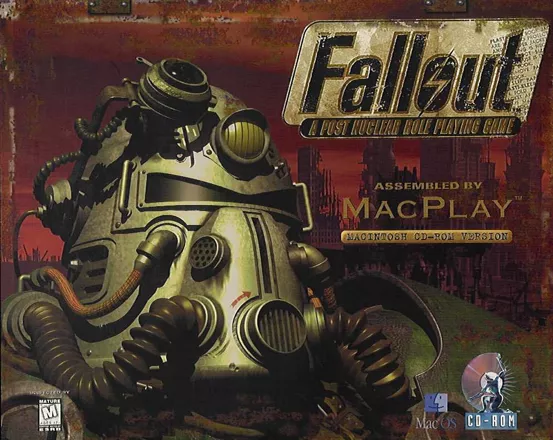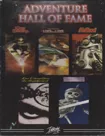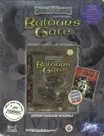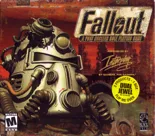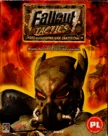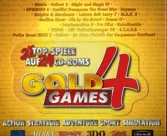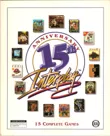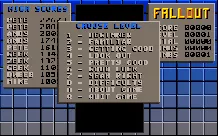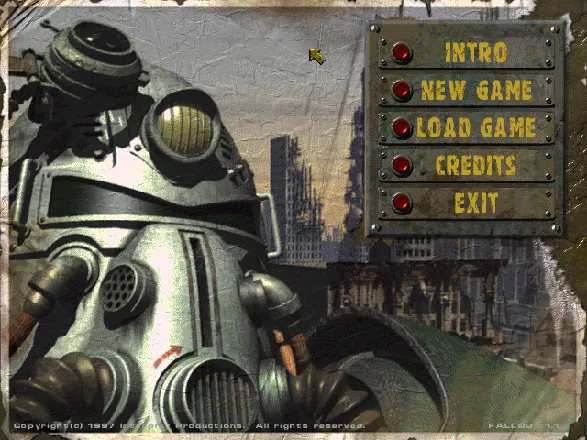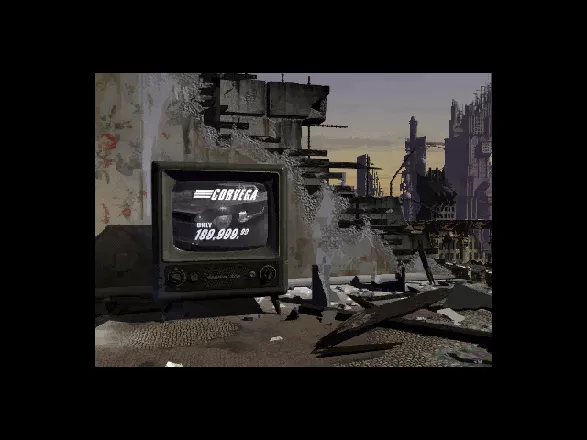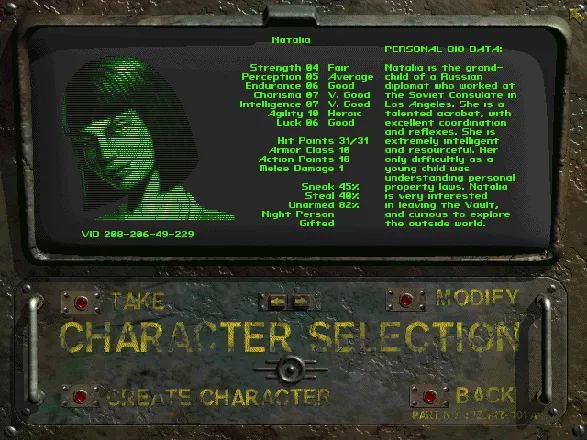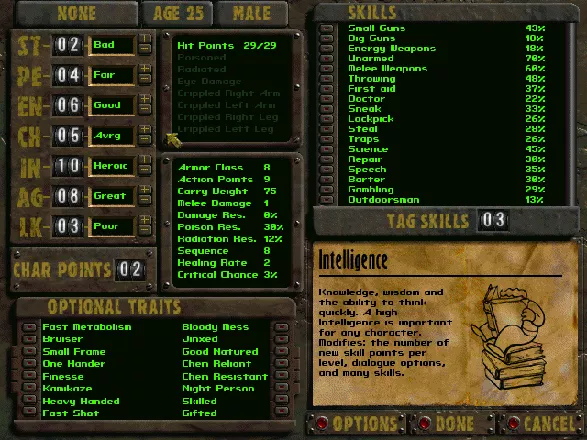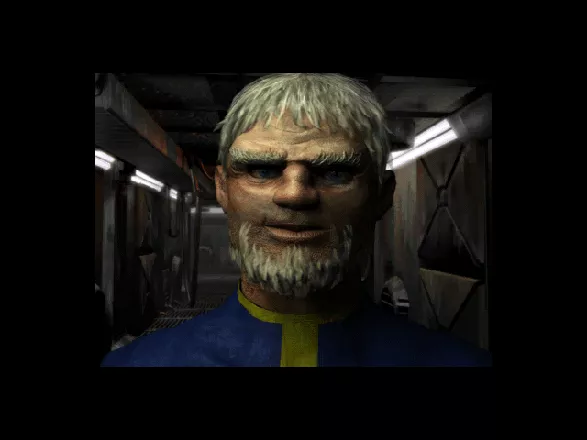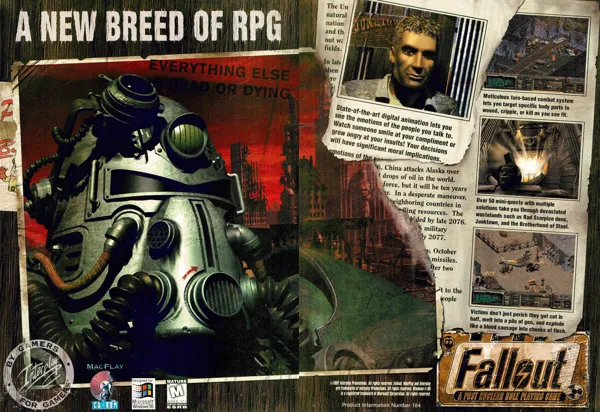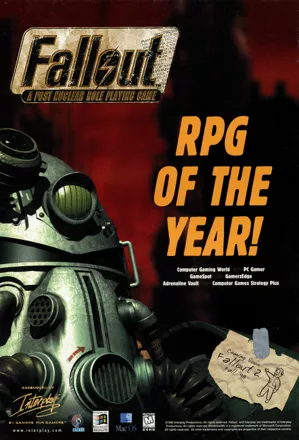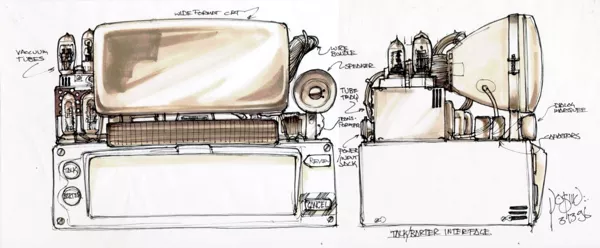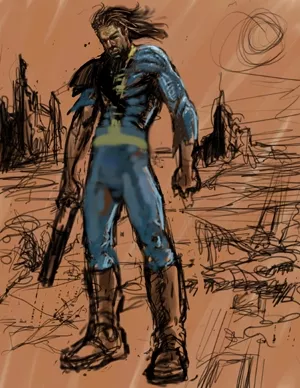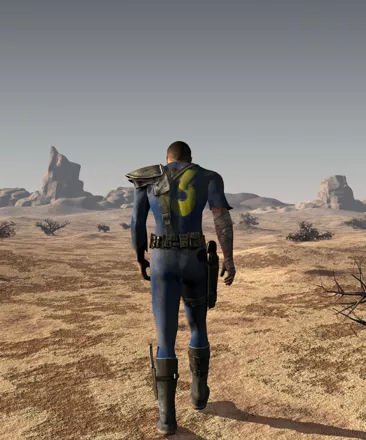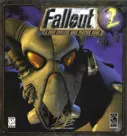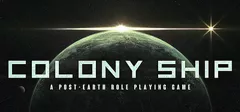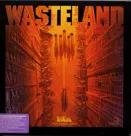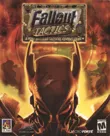Fallout
Description official descriptions
A devastating nuclear war had wiped out almost the entire population of the Earth. The civilization, as we know it, has been destroyed. The Earth has become a huge wasteland populated by mutated creatures. Only small number of humans survived and they formed communities living on the surface, where they mostly scavenge what remains from the pre-war civilization. Some lucky people managed to reach safety of the Vaults, huge underground dwellings, during the war. Recently, the water purification controller chip in Vault 13 broke. Without clean water, the people of the Vault cannot survive. One person is sent to find a replacement chip and ventures outside to face a dangerous world, hoping to return within a hundred and fifty days.
Fallout is a role-playing game that utilizes a character development system called S.P.E.C.I.A.L., an acronym formed from the first letters of the game's basic character attributes: Strength, Perception, Endurance, Charisma, Intelligence, Agility and Luck. In addition to having these attributes, the protagonist can also learn and improve skills, as well as acquire traits and perks.
Skill points are awarded when the player character levels up; traits are assigned during character creation, while perks are obtained every three character levels. There are eighteen different skills in the game, divided into combat, active, and passive categories. Combat skills include weapon proficiencies (e.g. small and big guns, melee, etc.); active skills are used for support or interacting with the environment (doctor, lockpick, science, steal, and others); passive skills are mainly dedicated to social interaction (barter, speech, gambling, and so on). Traits bestow various benefits upon the character while also imposing penalties; in contrast, perks are purely beneficial. By developing and customizing attributes, skills, traits and perks, the player is granted a considerable freedom in shaping the protagonist in his combat-related and social behavior.
The game has an open world which can be freely explored from the onset. Only a few quests are required to complete in order to advance the main plot; a vast amount of side quests is available. Thanks to the game's emphasis on social interaction, many problems can be solved in a non-violent way; in fact, it is possible to complete the game without engaging in battles at all, running away from enemy encounters and concluding the final confrontation in a relatively peaceful fashion. Conversely, the player can opt for a destructive path, killing everyone in sight. A Karma system is used to track the player's moral decisions during the game.
Combat in Fallout is turn-based. Participants have a limited amount of action points (AP) per turn; each action (including movement) depletes a certain number of AP, eventually ending a character's turn. The player can target specific body parts of enemies during battles. Characters may join the protagonist, traveling together and participating in combat as a party. Though the player may assign general commands to the companions, their actions are controlled by the AI, and they cannot be customized.
Spellings
- 異塵餘生 - Traditional Chinese spelling
- 辐射 - Simplified Chinese spelling
Groups +
- Fallout games
- Game feature: Hexagonal map
- Gameplay feature: Auto-mapping
- Gameplay feature: Character development - Skill distribution
- Gameplay feature: Day / night cycle
- Gameplay feature: Drug addiction
- Gameplay feature: Gambling
- Gameplay feature: Karma meter
- Gameplay feature: Multiple endings
- Gameplay feature: Radiation / radioactive poisoning
- Gameplay feature: Targeting system
- Protagonist: Female (option)
- Weapon: Minigun/Chaingun
Screenshots
Promos
Credits (DOS version)
154 People (140 developers, 14 thanks) · View all
| Producer | |
| Assistant Producer | |
| Division Director | |
| Asst. Division Director | |
| Original Producer | |
| Production Assistant | |
| Monkey Boy |
|
| Mac Assistance | |
| Art Director | |
| Lead Artists | |
| Artists | |
| Additional Art By | |
| [ full credits ] | |
Reviews
Critics
Average score: 88% (based on 43 ratings)
Players
Average score: 4.1 out of 5 (based on 576 ratings with 22 reviews)
The Good
Years after it's release Fallout is a name that still commands respect among rpg gamers and gaming enthusiasts alike and with good reason. After Diablo broke everyone's pre-conceptions by providing a FUN rpg-like experience based around a tile-based isometric gameworld, Interplay took the hint and developed a game that capitalized on the new graphic trend but enhanced the roleplaying side of things instead of being a medieval-themed whack-a-mole.
Thinking back a little it was quite a gamble for Interplay, but to their credit they did stack the deck to their advantage: Fallout was the first title to come out of their newly-formed rpg division, and as such paid homage to one of the company's greatest hits: the classic Wasteland (in fact the game is pretty much an unofficial remake). Interplay was NOT going to let this one fail on them and from the moment it came out it became evident the care and quality in design poured on it.
As with most legendary games everything has already been said about them, so I can be brief and just summarize why it rocks so. For starters this was the first rpg in a while that really took to heart the "role" in roleplaying, and as such allowed you to pretty much do whatever you wanted. This philosophy first became evident when you started your game through the character generation page and you realized that there were no classes... that's right, no predefined molds to get stuck into. Instead S.P.E.C.I.A.L. (as the character system got named) allowed you to shuffle a predefined level of attributes that molded the basic high and lows of your character and then you distributed your assorted points in the real heart of the beast: the skill system.
Summing up every possible action under a specific skill (small arms for gunfire, science for hacking and stuff like that, etc.) the developers crafted a solid gameplay system under which mostly every possible action was available. Yes, skill systems are not new, but Fallout's system managed to hit the spot on just about everything, by leaving out ambiguous, yet always present rpg skills like "leadership" or "octopramancy" (??) and simply focusing on correctly modeling a small list of solid, down-to-earth ones, that became the foundation for the solid gameplay. Gameplay which develops like a good-ol'-fashioned adventure game which relied on these skills to provide different paths and solutions to the problems at hand as well as provide different ways for you to interact with the gameworld. It's easy to see where the whole thing takes you: want to charm your way to the bad guy's lair by seducing the guard? You'd better have the right dialogue skills, which allow you to select more options when talking, and be the right person for the job (yes, Fallout is amongst the first games that I knew of that made actual distinctions in gameplay for male and female characters). Want to hack the security system so as to toast him with no effort? That's what those science points are for. Your character has no brains and needs to resort to violence? Go for it! As your character develops you construct him/her into whatever character suits your playing style and the addition of starting traits and the chance to select unique perks when leveling up allows you to add different, rule-bending capabilities to your character that keep things interesting as you can always add a nice twist to your character by say... adding bonus moves to your action pool, or making you a night-creature that gains bonuses when the sun goes down but penalizes you during daytime...
The system is flexible enough to provide lots of different responses to most quests, but that wouldn't be much of an achievement if you didn't have a proper gameworld that allowed you to try those different paths. This is the other key to Fallout's success: a wonderfully crafted gameworld filled with scripted events, complex locations and diverse set-pieces that is just as flexible as the skill system itself. Flexibility that even extends to moral grounds and which allows you step away from being the standard "paladin of justice" character and be a bit more naughty.... you know doing everyday things like raping & pillaging, betraying friends for money, blackmailing, extorting and generally being the bad boy/girl of your dreams. All actions that have consequences in your immediate gameworld (party members that may desert you, underworld doors that might open to you, etc.) as well as the larger plotline that looms around you (in fact, a kickass addition to the endgame is that you get a rundown of how you affected each location with your actions. How cool is that?).
Yes the game does nudge you into the "good" direction, and ultimately the plot revolves around you being the saviour of the world, but there's ample room for you to do naughty things in the ambiguously moral, dog-eat-dog society of the wastes, where decent farmers might be ready to stab you in the back at any time, and criminal overlords might provide the only measure of trust you can find... provided you play their game... A feat made possible by the grim, yet darkly humorous tone that runs through the entire game and which coats the whole experience in a satirically enjoyable mood that includes references to practically every post-apocalyptic movie ever made, and that permeates every aspect of the game, even the damage description texts! ("Dog receives XX amount of critical damage and spectacularly flies into the air exploding into tiny chunks of meat as it goes. Dog would have loved to see that, but unfortunately it was already dead".... :)))
This takes me to another key feature and which involves the incredibly detailed production design that went into the game. From the exceptionally moody intro sequence that places you into the apocalyptic mood faster than you can say "Nuke" to the distinct art direction that based it's look around 50's cold-war nuclear scares (seen Terminator 3? Remember the nuke shelter John and co. go into at the end? That's what I'm talking about) Ie. Valve-radios, vintage cars, friendly yet somehow disturbing PSA's that were also used to describe the many features in the game (with the uber-cool Pip Boy!![or Vault-Boy or whatever you want to call him] which also appears in the excellent manual). The graphics, composed of pre-rendered sprites and tiles give the entire game a distinct look that is always strictly in tune with the dark-toned mood of the game, and the exceptional music composed by Mark Morgan constructs a soundscape like no other with eery cues and tribal sounds. As in every decent rpg the story is a primordial element, and while boiling down to the usual "go kill gonzo" still manages to remain interesting and thrilling through the entire game, with the constant threat of a mutant armada looming around you just as in the original Wasteland (although they were robots back then) and with the added responsibility of saving a secluded society of Vault-dwellers that appealed personally to me as it made the game even more like one of my favorite comic book series: "Danske" by Wood/Villagran, which also dealt with an unwilling character going out into the unknown wastes of a post-apocalyptic world in search of the key to save her vault-dwelling friends and relatives. Said comic however did NOT have what has to be the BEST. ENDING. EVER. Shocking, emotional, and completely coherent with the game and subject, Fallout's gritty ending is another reason why it's so fondly remembered.
Oh, and lest I forget, Fallout's grim post-apocalyptic world is no exception to that rule-of-thumb in rpgs that dictate that sometimes there are no peaceful resolutions to conflict: and so it has it's own comprehensive combat system that was so good (save for some odd quirks, see "the bad") that it got it's own game (Fallout: Tactics). Basically what you have here is a full-fledged turn-based tactical combat system which is ruled by the aforementioned skill system (to determine accuracy, damage, etc.) and incorporates into that a stellar combat interface that includes shitloads of weapons with different firing modes, ammunition types and even supports called shots that allow you to blind a target or cripple them with a well placed bullet (be careful though: the same goes for you and your friends... and there are no magic resurrection temples in this game). Range and lighting take a major part in your stats and weapon customization allows you to enhance your weapons for extra damage or added features taking the depth of the combat mode even further. It's hard to believe that at the same time this was happening on a PC near you console gamers were drooling for the ATB system in FF7.... sheeesh....
The Bad
Graphically the game can get a bit monotone after a while, as there is only so much desert junktowns you can stomach. Besides that, there are some.... uh..."interesting" design choices which would have worked out if it weren't for some ill fated AI problems and interface issues. What I'm talking about here basically is party management and interaction.
The decision was made to make party members independent NPCs that just followed your character around, and while you can instruct them to keep a certain amount of distance from you, you have no way of controlling what weapons or armor they use or what the hell they do in combat. Now, this could have worked, unfortunately the shitty AI causes your allies to drop shotguns and start throwing flares at your enemies, run face first into an enemy wielding a mini-gun, throw grenades at an enemy that's locked in hand-to-hand combat with you and other assorted fuckups that will make you wonder if they are worth the extra firepower and inventory space (specially once you figure that the only way to share items with them is to use the same bartering interface you use with the rest of the world (??)). Their path-finding is also horrendous and more often than not, your buddies can make you get stuck in a corner whenever you are indoors, as they follow you and clutter around you, leaving you no room to maneuver. Not to mention that they are decidedly shallow, cardboard cut-outs characters that have less appeal than most npcs you encounter in the game.
There are also some stupid fuckups with the skill system's dice rolls that make sense system-wise, but are completely out of touch with basic physics laws and could have been resolved with some common sense. For instance, can anyone explain me how is it that a critical failure with a burst weapon causes someone to hit characters that are BEHIND his line of sight?? Believe me, there are no safe areas whenever anyone pulls out a burst weapon...
Finally, I felt it was a huge mistake to add a time limit to what's essentially a game about exploring the rich gameworld that surrounds you. Yes, the limit is removed in the later versions in the sense that it no longer forces a "game over" on you. But it still affects the game in many sucky ways (ie. the location endings).
The Bottom Line
To summarize Fallout in a few lines is a pretty bogus idea, but I guess I can try and say that it's a landmark achievement in the world of CRPGs and mature videogaming alike, not to mention the best post-apocalyptic game ever (except for it's sequel). If you are one of the poor fools that still hasn't played it do yourself a favor and pick up a copy ASAP, it's required gaming for anyone who considers himself a serious gamer and it's one of the coolest experiences you can have in front of a computer. Best enjoyed with a side order of Iguanas-on-a-stick and plenty of Nuka-Cola.
Windows · by Zovni (10504) · 2006
The Good
The second half of 1990's saw many great role-playing games, but three of them have the special status of franchise-starters and reformers in the genre: Diablo, Baldur's Gate, and Fallout. The first succeeded because of simplification; the second thanks to intense study of traditional material. Fallout, on the other hand, relies pretty much on one template only: Interplay's own groundbreaking Wasteland, of which it is a clear spiritual follower. It is therefore even more remarkable that this game managed to gain considerable popularity even in mainstream cycles despite being both non-traditional and hardcore at the same time. It adapted the revolutionary spirit of Wasteland to contemporary sensibilities, and the results are singularly impressive, to say the least.
Like its predecessor, Fallout opts for a flexible approach to role-playing. Character creation system leads you through a thicket of main attributes, skills, and perks, but these are not bound by classes, races, or any other comparable category. Darklands was certainly even more realistic in its depth and complexity while trying to avoid as many genre conventions as possible. But it is the genius of Fallout that makes it simple to play, yet hard to master; it never sacrifices pure fun and instant playability for its sophisticated system.
The most notable breakthrough of this system - and a further important step towards a more inclusive understanding of role-playing - is its greater openness to actions that do not necessarily pertain to combat. For years, role-playing games have been mostly about getting better at killing enemies. Social interaction was added to some games, but nowhere does it become such an integral part of the gameplay as in Fallout. According to this game, "role-playing" means that you make choices and form your behavior according to your own views, or at least according to what you have in mind at that particular moment. Fallout lets you decide everywhere, in any situation. You can kill every person you see in the game. Much more importantly: you can complete the entire game without killing a single creature. I don't think there was ever another RPG that let you do that.
Character development thus gains a whole new meaning: indeed, you are developing a real character rather than just somebody who can kill monsters faster. It's not only about getting the best weapon: it's also about surviving in a situation where you don't have that weapon - or, rather, where you decide you want to complete the game without ever using that weapon. It's about making your character what you want them to be. Feel like bullying people and solve problems with brute force? Fine, then create a physically strong idiot and hope no enemy is too tough for him. More inclined towards diplomacy? Make your character a cunning fellow who can talk his way out of every situation, but don't cry if he gets bitten by sewer rats. Be a doctor or a hacker, or don't be anything in particular - just be yourself, go with the flow.
In case you are inclined towards more traditional RPG activities, fear not: Fallout delivers plenty of that as well. There are quests and sub quests to tackle, dangerous dungeons to traverse, and all sorts of creatures to vanquish. There are diverse weapon specializations, items to collect, and many opportunities to fight and pillage to your heart's content. The game's turn-based combat system works exceptionally well in spite of a few shortcomings, and is very in-depth, including features such as differentiated body part damage; calculations of distance, attributes of combatants and weapon ratings allowing to express every action in percentages of success; action points that determine the amount of actions per turn, leading to vast tactical possibilities, and so on.
Of course, the system alone wouldn't be enough to provide hours upon hours of gourmet RPG fun - you also need a world to which this system could be properly applied. I think this is where Fallout truly triumphs over Darklands: it has realism in common, abstract categories (be violent, be kind, be sneaky, etc.), but it marries this realism to a perfectly satisfying game world, with unique locations, characters and situations rather than just copies of the same town and clones of the same pilgrims and wandering monks. In other words, it achieves perfect balance between player-created and scripted content, between free-form playing and attachment to existing material.
In fact, the world of Fallout is a real beauty, and I'm positive that was a big factor in its rise to popularity: you can be easily immersed into the game without even beginning to understand the extent of its system's complexity. Just start playing and feel the game's intense atmosphere. And Fallout does not use cheap means in order to impress: it achieves the effect by paying a lot of attention to visual detail, creating an instantly recognizable, memorable stylistic environment.
Wasteland stood out with its unusual (for video games of the time) preference for a post-apocalyptic setting when most RPGs were medieval fantasies. But technology wasn't powerful enough then to really bring out that difference in a tangible, sensual way. Fallout, on the other hand, is a piece of moody art almost as much as it is a great role-playing game. Behind mutants, obscene cultists, and Nuka-Cola hide serious speculations about the future, manifested in the game's artistic amalgamation of World War II themes, nostalgic American culture of the 1950's, and cold, bleak high-tech elements. Fallout sets its unique tone right away with one of the best introduction sequences I've seen in a video game.
The Bad
No game is perfect. The original release of Fallout was quite buggy, with some broken quests and erratic NPC behavior problems. Later patches corrected many of the issues, but a completely smooth experience is not guaranteed. In particular, your companions display weird logical thinking more often than not, and their AI is questionable at best. They would regularly damage you in combat and do idiotic things such as using rocket launchers in cramped quarters etc. They are also not particularly talkative or significant for plot-related situations.
I don't quite see why they had to take away the player's control over those companions. It would be understandable in a game with fast-paced, real-time combat like Ultima VII, but turn-based battles call for micro-management, and Fallout only allows it for the protagonist. This leads to further lack of attachment to the rest of your party, compelling you to dismiss your crew and fight solo - which, under the conditions of slow, tactical combat, is not always particularly thrilling.
The Bottom Line
Fallout is a game that will survive, not matter how many others are forgotten. It will rise like a phoenix from the ashes of mediocrity and oblivion, to tell us and show us how to make a great RPG. This game should be put on a pedestal and taught to developers in special schools.
Windows · by Unicorn Lynx (181780) · 2014
The Good
Let's look back to the year 1997. I was in college, and a year earlier me and my bud Paul started up an underground magazine called "Nerdgasm." I wrote reviews and managed a column called "The Whiny Movie-goer." The magazine spread around the campus and got a cult following. One morning I woke up with Paul standing over me, holding the box for Fallout. He told me I had to review it. When he told me it was an RPG, I said 'No.' I wasn't too big on RPGs. He literally began poking me with a stick, and two days later I finally gave in to his stick poking and installed the game. Long story short: I fell in love with the game, and it won Game of the Year in our mag. The next year Fallout 2 would win, although as a gag I said that it tied with Fallout 1. It would become a running joke all the way until the magazines death that at each Game of the Year ceremony, I attempt to shoehorn in Fallout as game of the year again or say its the "real" game of the year but I was stick poked into picking a game actually from that year.
12 years later, and the game is still the greatest RPG ever, and already a nominee for Game of the Year 2009, right up with "Prototype."
Lets say that during the height of the cold war crisis, the nuclear bombs actually fell. Lets say that the Chinese attacked America. Lets say that the future is a post apocalyptic hellhole where raiders and slavers menace poor civilians and mutants wait outside peoples homes expecting a nice meal of human flesh. That's the idea behind Fallout. The story itself has you taking upon the role of a Vault dweller from Vault 13. The Vaults are numerous underground Fallout shelters that were made to protect humanity from the bombs. Vault 13 hasn't opened since the war, and generations have bred there, all living and dying in the vault. Yet recently Vault 13 has a little problem... The machine that gives you water is busted, and there's no way to replace it without getting another one from another vault. Vault 13 is opened for the first time in thousands of years, and you walk out into the frightening world of The Wasteland. As you quest for a spare waterchip, you will encounter many strange denizens, mutants, and learn that the world outside the Vault ain't exactly heaven. The games second act takes a dark yet brilliant turn, but my reviews are certified spoiler free. The story is great, and the world is immersive and unique, exploring it is a treat and hunting down the many unique denizens proves rewarding, especially when you run into HAROLD!!!!!!!!!!!!!!!!! :B I really like Harold. He's the funniest game character ever. Although his level of hilarity isn't as epic as it is in Fallout 2, he's still the funniest mutant ever to not menace society. He's also one of the few mutants you WONT want to shoot. On the topic of humour, Fallout has a great sense of humour. The sense of humour in Fallout is brilliantly dark, sadistic, and perverted, yet even those who usually cringe at jokes about death, disease, mutation, sex, and sex with diseased undead mutants are likely to laugh at something in Fallout. The games 50's "Duck and Cover" style aesthetics and charm really help lighten the horror of the post apocalypse. The massive contrasts are surprisingly balanced. The opening cutscenes alone set both tones and get you in the mood for something scary and something funny.
The combat system is great, and has been unmatched in the realm of CRPG games. The game is turn based, but rather than just repeating the process of "Select move, select monster, watch what move does, reselect move again, select monster again, watch what move does" every friggen' time you fight something. Instead, Fallout requires you to pay more attention and rely on your wits. When you enter combat, whether you're fighting one monster alone or a group of baddies with some squad mates, you will enter a grid based combat scenario and are given "Action Points." How many action points you have is based on the games S.P.E.C.I.A.L. attribute system. Each item and move costs action points. If you have a few extra action points to spare, you can target a specific body part of your foe, which can really help the outcome of battle. Action points will run down during your turn, and will restore when it is your turn again. Bad guys and team mates use the same system, so the game never feels unbalanced, although naturally beefier enemies will have their own unique attributes and of course all the foes/team mates in the game will have different skill sets based on their race/faction.
On the topic of factions, Fallout has the freedom of choosing who you ally with or don't. Who will you ally with? The vicious raiders that murder and steal? How about the ever mysterious Brotherhood of Steel, a group of modern knights bent on keeping the peace and preserving our technology and history. Many other factions await, and regardless of their moral beliefs, you can make the choice to join their ranks. The game has a karma system, which takes into account your good and evil actions. You are given a great amount of freedom, and whether you will save the world, burn it greater, or leave no impact at all through neutrality, its all up to you.
Fallout has a relative difficulty curve, but once you get the swing of things, the games intuitive interface will become second nature. Some parts can be frustrating, but you will be compelled to overcome your weaknesses and build your strengths. The SPECIAL attribute system and a system of "Perks" and a large skill tree all offer an expansive character building system.
The graphics may not "Wow" in 2009, but when I'm looking at older games, I always look at the graphics from the eyes of someone living in the year it was released, and rate it based on that. I remember the games looks in 1997, and they looked great. The sprites are large and pixelation free, and the various gruesome death animations, characters and "talking heads" looked great. The sound is great too, sound effects all match up, and the eerie atmospheric score puts you in the mood. The game has great production values. The only complaint I had then that I still have now, is that I wish there were more full vocals and talking head graphics.
The game is so engrossing and fun, its hard to put down at all, if ever. Everything is great.
The Bad
Uhm... Uhh....
Poor compatability on modern computers?
Well, that's not an actual problem with the game, just for modern computers...
Uhm.. Radioactive scorpions are scary? No, that's not a complaint either since they're supposed to be scary....
Ooh! Ooh! I know! Harold is the funniest character ever! Wait.. no, that's another praise...
Uhh...... You know what? This game is perfect. The only true negative is that it ends. :'(
The Bottom Line
I still love this game, I love Fallout 2, and although it can't compare with the first two games euphoric feeling, Fallout 3 is a great successor to the series. Fallout Tactics is a great spin off as well. I may review Fo3 on here, but my review of Fallout 2 wouldn't be any different than this review. It would get 5 perfect stars. This is the greatest RPG of all time, if not the greatest game of all time. If you like RPGs, buy this. If you like strategy games, buy this. If you don't like RPGs, buy this. If you don't like strategy games, buy this. It has something for everyone, and if you haven't played it you are missing out. The complete collection - save for Fallout 3 (Although it can be bought from here as well) - is available DRM free on Steam for only 20 bucks for the whole set. It's also available on GameTap and Good Old Games. If you have it, or even if you don't and are missing your discs, buy this incredible game.
Windows · by Kaddy B. (777) · 2009
Discussion
| Subject | By | Date |
|---|---|---|
| I guess I'm a bit annoyed by open-endedness. | chirinea (47496) | Jun 23, 2015 |
| Again a Fallout (Jewel Case) cover | bubbleman1987 | Sep 5, 2012 |
| Countries where have been sold the Fallout games | bubbleman1987 | Sep 1, 2012 |
| Unknown Cover | bubbleman1987 | Sep 1, 2012 |
| GOG.com giveaway | Cavalary (11445) | Apr 5, 2012 |
Trivia
1001 Video Games
Fallout appears in the book 1001 Video Games You Must Play Before You Die by General Editor Tony Mott.
AI
The artificial "intelligence" makes the characters do some pretty amazing (amazingly stupid, anyway) things. Twice I have had _all_ friendly NPCs in combat repeatedly picking up a lit flare I'd dropped and throwing it at the enemy. An AI routine that makes people with firearms try to whack their opponents with flares deserves mention, in my opinion.
Alternative credits
Hold down shift key and click on the Credits button to see some alternative credits.
Bugs
Fallout shipped with a number of blatantly obvious bugs that almost inevitably seriously screwed up the game. One of the most amusing bugs caused Ian (one of the NPCs that can join your party) to suffer from "Agent Smith Syndrome", multiplying rapidly until there were 100s of him running around the game world killing everybody.
Besides screwing up the game world, this would also cause your game to slow to a crawl because whenever combat started, you'd have to wait for every single Ian to take their turn before control is returned to you.
Concept Art
As of 2002 people who worked on the Fallout games are employed by Black Isle or Troika Games, and have released a number of pre-production drawings and sketches. Thanks to "fallout.scifi.pl" website, you can see them in one place. Sketches - posters - un-used GURPS Vaultboy art
Fallout Bible
The best source of Fallout design and production memoirs, world history, and rare interviews would be "Fallout Bible", found on both official Black Isle website, and on "Duck and Cover" fan-site.
Goodies
Original release includes a "Goodies" folder that includes a Windows screensaver as well as the prototype version of the game developed in 1994, which consists of a knight walking around an isometric landscape and which would eventually evolve into the Fallout engine (requires dos4gw to run).
GOG release
In December 2013, Fallout, Fallout 2 and Fallout Tactics were given away for free on the download distribution platform GOG. This was the last month Interplay had the distribution rights for the games before they went to Bethesda. The games were pulled from GOG on January 01, 2014. They were readded to the catalogue with Bethesda as publisher on August 26, 2015.
Inconsistencies
The Fallout manual says the thickness of Vault's blast door is '4 yards of steel'. 1 yard is almost 1 meter, which means the door's thickness is more than twice your height. That's 12 feet! In comparison, NORAD's 25 ton door is mere 3.5 feet thick.
Low intelligence
If you create your own character, you need to have an intelligence of at least 4. Any lower than that, and you will find it very hard to complete the game because you can't converse with anyone -- your only dialogue options are various grunts or other gutteral noises. I'd recommend trying it once, as it's rather amusing.
An interesting aside is that the dialogue with the cook in Shady Sands doesn't seem to be affected... a character with the lowest possible intelligence can still proclaim, "That smells great! I bet it tastes terrific!" Must be some good food, indeed.
Maybe
The song that plays during the introduction and closing credits is Maybe by the Ink Spots, a black vocal quartet from the 1930s-1940s. As of 2001 most of their work has been re-released and can be bought for $10 - $12 per CD.
Recipes
Fallout's manual comes with a "survival recipes" appendix, which has actual recipes!
References
- The game includes all sorts of odd references - you may stumble onto a UFO which has a sign reading, 'Property of Area 51. Please return if found' and an alien corpse with a ray gun and a picture of Elvis.
- There is a way cool reference to the 1960's era blue UK Police Box that gives you a motion scanner. Doctor Who fans will pick up on that one. The TV which appears in the Introduction Movie is a Radiation King. In The Simpsons*, Homer once said that he spent hours as a child watching tv in the old Radiation King.
- Set your Windows to use large icons and have a look at the Fallout icon or shortcut. This is probably a face of one of game's creators.
- If you search the log files in the computer in the upper level of the Military Base, you will see that two of the names in the actually are developers of the game: Boyarsky and Anderson. Try to download those log files and you will get an "unexpected end of line" error message.
- At one point you'll have the opportunity to chat with a member of the Brotherhood of Steel who says the line "I'm here to kick ass and chew bubble gum. I'm all out of gum". This is a play on the memorable "I have come here to chew bubblegum and kick ass... and I'm all out of bubblegum." from the movie They Live which is also referenced in Duke Nukem 3D.
- There are references to Mad Max in the game. Dogmeat is the first reference, as Max has a dog in Mad Max 2. In addition, when the description of the previous owner of Dogmeat is given, it describes a person with a shotgun and wearing a leather jacket. This is basically what Max wears in Mad Max 2. The shotgun is his weapon in the movie as well. The other reference is in the ending cinematic. The player has a single barrel shotgun on his hip, same as Max, the player wears what appears a shoulder section of the football pads on his left shoulder, so does Max. There is a bit a limp in player's walk, Max limps because of his injured knee. Finally player is heading in to the wasteland just like Max did at the end of his movies.
References to Wasteland
There are several references to the original Wasteland in the game: * Far Go Traders: Brian Fargo was one of the lead developers of the original Wasteland game. * Tycho: Talk to him a bit, and you find out that he's been through "Ranger Training". In Wasteland, the Desert Rangers were the "heroes" of the game. * The Red Ryder BB gun: Red Ryder showed up in the small town of Highpool in Wasteland (eerily similar to Shady Sands in Fallout). In Fallout, the Red Ryder LE BB Gun is one of the more powerful non-energy weapons you can find, if you're lucky. * Dugan, the Blades' Nuka-Cola addict, is probably named after Bill Dugan, who was part of the Wasteland team
RPG System
During early stages of development, Fallout was designed using G.U.R.P.S. roleplaying system. However, when Steve Jackson Games (owners of G.U.R.P.S. license) pressured the development team to cut down on violence, a decision was made to switch to S.P.E.C.I.A.L., home-brewn rules-light GURPS clone, and abandon G.U.R.P.S. altogether.
Secrets
During your travels from city to city, you may come across a GIANT footprint in the ground with a bloody mess in the middle of it. Search the mess and you will find a Stealth Boy.
I guess the Stealth Boy works really well, since the thing that stepped on the guy carrying the (active) Stealth Boy never saw him. :-)
Text to speech
The Macintosh version of the game supported a system extension called "Text-to-Speech" which enabled text on screen to be read out by a computer generated voice. The game's PipBoy could be used with the extension which "spoke" all replies this PDA like device gave the user. For example, when the player used the alarm clock to rest the PipBoy would speak a long-stretched wake-up call: "waaake uuup!".
The option for "PipBoy speech" could be toggled in the options menu.
Time limit
The original release of the game had a 500 days time limit in which to complete the game (400 if you hired the water merchants). This was because the mutant army was constantly looking for your vault, which they eventually find and invade once the limit expires. The limit was removed on the subsequent patches, but you can still see the cutscene that played when the limit expired if you select to willingly join the army and reveal the vault's location to the master.
Although you no longer get an automatic "game over" after 500 days after installing the patches, taking too long to finish the game still has consequences. The mutant army is still on the march, and even if they no longer can seize your vault, they will still gradually conquer the various towns as time progresses. This has no in-game effect (the mutants don't actually show up in the towns), but during the game's ending you'll get a bad "we got smooshed" ending for places like the Necropolis, Hub, or Followers if you took too long to stop the mutants.
Violence
In the game's options, you can adjust the game's violence level: * US Release - 4 violence levels available - no cuts * UK Release - 3 violence levels available - the most brutal setting is blocked * German Release - 2 violence levels available - the two most brutal settings are missing...
In both the UK and German release all children are missing.
Awards
- Computer Gaming World
- March 1998 (Issue #164) – Role-Playing Game of the Year
- June 2000 (Issue #191) – Introduced into the Hall of Fame
- GameStar (Germany)
- Issue 12/1999 - #51 in the "100 Most Important PC Games of the Nineties" ranking
- PC Gamer
- April 2000 - #18 in the "Readers' All-Time Top 50 Games" Poll
- October 2001 - #4 in the "Top 50 Games of All Time" list (together with Fallout 2)
- April 2005 - #10 in the "50 Best Games of All Time" list
- Power Play
- Issue 02/1998 – Best RPG in 1997
Information also provided by Adam Baratz, Ajan, Alan Chan, Alexander Schaefer, ApTyp, Entorphane, Fire Convoy, glidefan, Heikki Sairanen, Kabushi, Late, MirrorshadesUK, n-n, PCGamer77, Trixter, Ye Olde Infocomme Shoppe, ZombieDepot, Zovni and Evolyzer
Analytics
Upgrade to MobyPro to view research rankings!
Related Sites +
-
DOSBox Wiki
The encyclopaedic page of the DOSBox project. -
DOSBox, an x86 emulator with DOS
Compatibility information page about the original game and its DOSBox versions. -
Duck and Cover
One of the most well-known Fallout fan sites. -
Fallout Wastelands - The Vault Dweller's Survival Guide
An excellent unofficial fan site for the Fallout series. -
IMDb, the Internet Movie Database
Game database entry: reviews, trailers, ratings. -
Interplay's archived site
Copy of Interplay's Fallout official page at Internet Archive -
Macintosh Garden, an abandonware games archive
For Macintosh: reviews; game packaging; downloadable releases; manual; screenshots; additional material. -
Macintosh Garden, an abandonware games archive (Classic Mac OS)
For Classic Mac OS: reviews; game packaging; downloadable releases; manual; screenshots; additional material. -
Matt Chat 66
Video interview with Tim Cain about the development and reception of Fallout (part 1/2) -
Metacritic (PC)
For PC: reviews; ratings; critics; trailers; additional material. -
Movie-Censorship.com
Comparison between the uncensored US version and the censored European version. -
No Mutants Allowed
Real Fallout fans never die - they just get a little radioactive after a while! NMA is the most comprehensive unofficial Fallout series site on the internet. -
RPG Classics - Fallout Shrine
Fan made shrine for Fallout includes a walkthrough, weapon/armor information, and a list of easter eggs found in the game. -
Replacementdocs (PC, Manual)
Documentation for DOS/Windows. -
Replacementdocs (PC, Quick Reference Card)
Documentation for DOS/Windows. -
The Vault
Wiki based encyclopedia about all things Fallout.
Identifiers +
Contribute
Are you familiar with this game? Help document and preserve this entry in video game history! If your contribution is approved, you will earn points and be credited as a contributor.
Contributors to this Entry
Game added by Droog.
OnLive added by firefang9212. Linux added by Evolyzer. Macintosh added by LepricahnsGold. DOS added by Spartan_234. Windows Apps added by Koterminus.
Additional contributors: Unicorn Lynx, Apogee IV, Kabushi, Vaelor, Pseudo_Intellectual, jlebel, Solid Flamingo, Luchsen, Paulus18950, Tatar_Khan, Patrick Bregger, Plok, FatherJack, ZeTomes, Evolyzer.
Game added August 17, 1999. Last modified April 18, 2024.
